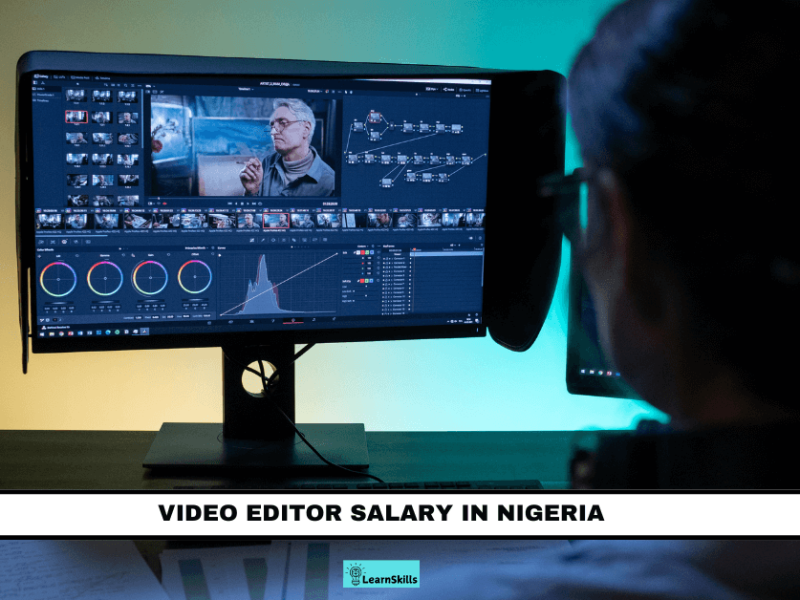The role of a video editor is becoming vital in Nigeria’s growing media landscape. As businesses and creators focus on visual content, understanding the salary range for video editors can help you navigate your career choices.
In 2025, the average salary for a video editor in Nigeria is NGN1,100,000 per year, amounting to NGN 100,005 monthly.
Salaries can vary, with some video editors earning as little as ₦20,000 monthly, while others may reach upwards of ₦5 million, depending on their skills and job demands.
The growing demand for skilled video editors opens doors to various roles, from freelance positions to full-time employment in companies, making it a promising path for creative individuals.
Overview of the Video Editing Industry in Nigeria
The video editing industry in Nigeria is evolving quickly. There are many job opportunities, and the demand for skilled editors is increasing. You can find various roles in this field, enabling a range of career paths.
Current Market Demand for Video Editors
The demand for video editors in Nigeria is strong. Many businesses are producing videos for marketing, training, and entertainment. According to recent data, average salaries for video editors vary by experience and location.
For instance:
- Entry-Level: ₦35,000 – ₦45,000 per month
- Mid-Level: ₦100,000 – ₦150,000 per month
- Senior-Level: ₦198,307 monthly on average
Remote positions are also available, allowing you to work with clients worldwide. This flexibility is appealing to many in the industry. Job postings can be found on platforms like Jobzilla and LinkedIn.
Typical Career Path and Progression
The video editing industry offers a clear career path for aspiring editors. Starting as a junior editor is common. You typically learn the basics, such as software tools and editing techniques.
You may move into roles like a senior editor or a lead editor after gaining experience.
Here are some common career steps:
- Junior Video Editor
- Video Editor
- Senior Video Editor
- Lead Editor or Director of Video Production
Networking and building a portfolio are vital for career growth. Many video editors supplement their skills with courses in related fields. This commitment can help you stand out in a competitive job market.
Factors Influencing Video Editor Salaries in Nigeria
In Nigeria, several factors can affect the salary of video editors. These factors can help you understand what to expect in terms of pay based on experience, location, and employment type.
Experience and Expertise
Your experience level is crucial in determining your salary as a video editor. Entry-level editors can expect to earn less since they are just starting. Meanwhile, those with 3-5 years of experience generally see a significant increase in their pay.
For instance, seasoned video editors with over 10 years of expertise can earn considerably more than the average salary. Your proficiency with different software tools, such as Adobe Premiere Pro or Final Cut Pro, can also enhance your earning potential.
In Nigeria, editors specializing in motion graphics or animation may command higher salaries due to the added skills required.
Location and Cost of Living
Where you work in Nigeria can significantly influence your salary. For example, video editors in major cities like Lagos earn higher salaries than those in smaller towns. This is due to the cost of living and the demand for video editing services in urban areas.
In Lagos, salaries range significantly, often around NGN 1.6 million yearly. In contrast, a similar position in a smaller city might offer lower pay, reflecting the local economy.
Other factors, such as local industry growth and the presence of media companies, also affect salary levels.
Type of Employment
The type of employment you choose will affect your income as a video editor.
Freelance editors can experience varying pay. They may earn more per project but generally lack consistent income. On the other hand, full-time positions often provide stability and additional benefits, such as health insurance and paid leave.
Companies in Nigeria may offer competitive salaries plus bonuses for full-time roles, while freelance rates can vary widely based on client budgets.
Understanding these distinctions can help you make informed decisions about your career path and salary expectations.
Average Salary Range for Video Editors
Video editing salaries in Nigeria can vary significantly based on experience and skill level. Understanding these ranges helps you set expectations, whether you are starting or seeking advancement in your video editing career.
Entry-Level Positions
You can earn between NGN20,000 and NGN100,000 monthly as a new beginning editor. This range applies to those who are just starting and may have limited practical experience.
- Typical Salary: NGN40,000 – NGN60,000 per month
- Job Titles: Junior Video Editor, Assistant Video Editor
In entry-level roles, you may work on smaller projects and assist more experienced editors. Building a strong portfolio and gaining skills can lead to higher pay and better job prospects.
Mid-Level Positions
The salary increases considerably after a few years of experience. Mid-level video editors in Nigeria typically earn between NGN 100,000 and NGN 300,000 monthly.
- Typical Salary: NGN 150,000 – NGN 250,000 per month
- Job Titles: Video Editor, Motion Graphic Designer
At this stage, you will likely take on larger projects with more responsibility. Employers value your ability to manage projects and collaborate effectively with teams, which can lead to additional income opportunities.
Senior-Level Positions
Senior video editors can command higher salaries, earning between NGN 300,000 and NGN 1,000,000 monthly.
- Typical Salary: NGN 500,000 – NGN 800,000 per month
- Job Titles: Senior Video Editor, Lead Editor
These positions often require extensive experience and a strong portfolio. As a senior editor, you may lead teams, mentor junior staff, and oversee complete production processes, reflecting your expertise in the field.
Comparing Salaries: Freelance vs. In-House Video Editors
When considering video editing as a career in Nigeria, you may wonder about the salary differences between freelance and in-house positions.
Freelance Video Editors
- Pay Range: Freelancers earn between ₦20,000 and ₦5,000,000 per project.
- Flexibility: You set your hours and choose projects that interest you.
- Variable Income: Income can fluctuate based on the number of clients and demand.
In-House Video Editors
- Average Salary: The average in-house editor’s salary is around NGN 100,005 monthly.
- Job Security: Full-time positions may offer more stability and benefits.
- Consistent Pay: You receive a steady paycheck, which can be helpful for budgeting.
Comparison
Many freelancers report earning more than in-house editors, especially those with a good reputation. However, in-house editors often receive benefits such as health insurance and retirement plans.
Market Factors
Salaries can vary based on experience, skill level, and company size. In larger cities like Lagos, you might find higher-paying opportunities.
Improving Income as a Video Editor in Nigeria
As a video editor in Nigeria, there are several effective ways to boost your income. Focusing on education, networking, and exploring specialized areas can lead to better opportunities and higher earnings.
Continuing Education and Skill Enhancement
Investing in your education is crucial. You can take online courses to learn new editing software or techniques. Platforms like Coursera and Udemy offer many options.
- Software Training: Learn tools like Adobe Premiere Pro, Final Cut Pro, or DaVinci Resolve.
- Certifications: Obtain recognized certifications to enhance your resume.
Regularly updating your skills helps you stay competitive. Attend workshops and local meetups to learn industry trends. The more skills you have, the more jobs you can attract.
Building a Professional Network
Networking is crucial in increasing your job opportunities. Connect with other video editors, filmmakers, and content creators.
- Join Online Communities: Platforms like LinkedIn, Facebook, and local forums can be valuable. Participate in discussions and share your work.
- Attend Events: Go to film festivals, local screenings, or industry conferences. Meeting people face-to-face can lead to collaborations and job offers.
A strong network helps you find work and provides valuable advice and support in your career.
Exploring Niche Markets
Finding a niche can set you apart from other video editors. Specializing in a specific area can lead to higher pay and more opportunities.
- Types of Niches: Consider social media content, wedding videos, corporate videos, or animation.
- Tailored Services: Offer unique services that cater to specific client needs, such as drone footage or 360-degree video.
Research the demand in your chosen niche. Then, tailor your portfolio to showcase your expertise in that area. Focusing on a niche can make you a go-to expert and significantly improve your income.










